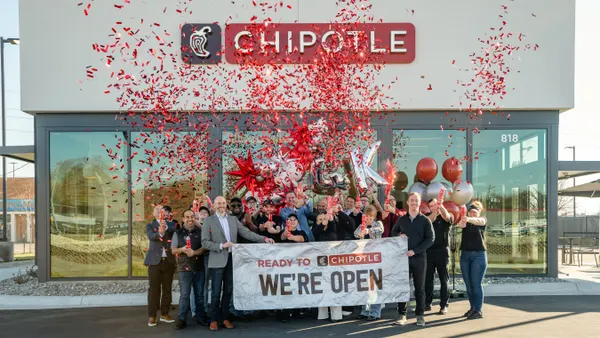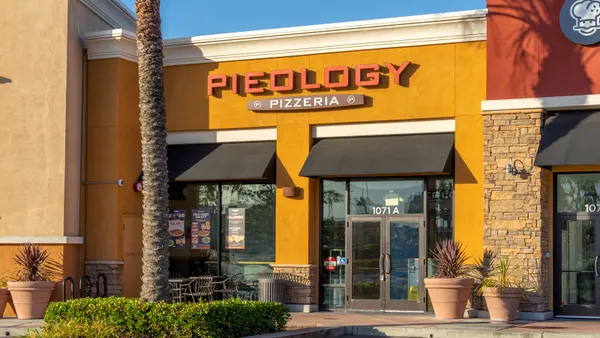Dive Brief:
- McDonald’s franchisees are more optimistic than they have been in years, according to findings by Kalinowski Equity Research reported by Business Insider. The average business outlook for these owner-operators is slightly below the 17-year-old survey’s all-time-high, recorded in early 2004.
- Kalinowski reports that McDonald’s sales momentum has been driven by its Travis Scott and J Balvin Meals, as well as its spicy chicken nuggets promotion.
- Some franchisees suggested that the Golden Arches is also benefiting from independent restaurants' struggle to survive the pandemic. Kalinowski Equity Research CEO Mark Kalinowski told Business Insider the burger segment as a whole is "going really well," noting that September was one of the best months of the last decade for the category, driven by McDonald’s and Wendy’s.
Dive Insight:
McDonald’s and many of its fast food rivals have been largely insulated from pandemic disruption because of their drive-thru channels, which provide customers access even as dine-in capacities remain limited across the country. The drive-thru has no doubt become a table stakes channel during the crisis, allowing systems like McDonald’s to largely remain open while casual dining concepts and independents have had to close or pivot quickly to off-premise operations. The channel accounted for nearly 90% of McDonald’s sales during Q2. Franchisees expect the drive-thru to continue to provide momentum in the winter as many restaurants are forced to close their outdoor dining areas.
But this franchisee optimism is about more than just the drive-thru. In the Kalinowski report, operators also cited pent-up demand from consumers experiencing cooking fatigue and cabin fever. The National Restaurant Association reported the scope of this demand in late August, showing that a majority of adults are not ordering takeout or delivery from restaurants as often as they’d like, while a strong majority of consumers said they would like to be dining out at restaurants more frequently.
McDonald’s has also received quite a bump from its recent promotions, including the Travis Scott Meal, the J Balvin Meal and the Spicy Chicken McNuggets introduction. The chain leveraged what it called a "marketing war chest" to support these promotions, investing an incremental $200 million to accelerate its recovery. The plan seems to be working. McDonald’s experienced supply chain shortages from the popularity of the Travis Scott Meal and the McNuggets rollout. In September, UBS noted that franchisee checks are "better than expected," while Wells Fargo added that the Travis Scott Meal specifically helped the brand connect with an audience that has been "a weak spot over the past 20 years."
All of these recovery efforts seem to be leading to a positive cash flow for franchisees. During the chain’s Q2 call, CFO Kevin Ozan said this cash flow and access to capital has led franchisees to want to invest more in the business. Last week, McDonald’s reported a comp sales increase of 4.6% in Q3 prior to its full quarterly report, due Nov. 9.
Its burger peers seem to be experiencing the same momentum. During Burger King parent Restaurant Business International’s earnings call Tuesday, CEO Jose Cil said the vast majority of the company’s franchisees exited Q3 with healthy balance sheets.
"As our system has recovered, unit economics continue to be strong and nearly all of our franchisees are well-capitalized," he said, adding that those franchisees are confident in the company’s long-term vision.
Of course, it helps that these well capitalized companies are able to provide a strong buoy for franchisees in a time of crisis, while independents don’t have that luxury. RBI, for example, is making investments in its franchisees drive-thrus, converting single drive-thrus to double drive-thrus, upgrading menu boards and adding AI-driven suggestive selling.
Because of this increased cash flow, franchisee and corporate relations at McDonald’s received its best ranking in the past five years of the survey. This result comes after quite a bit of work throughout the past two years marred by franchisee lawsuits, frustration with the chain’s coronavirus response, a very public ouster of its CEO, allegations of racial discrimination and the formation of an independent owners association in response to remodel costs and other requirements.










